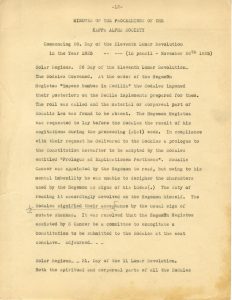Professor Seri on Brazil’s election outcomes
November 3, 2022
Concordy secured an interview with Professor of Political Science, Guillermina Seri, on her perspectives on the outcomes of Luiz Inácio Lula da Silva winning Brazil’s election. Below is a distillation of the interview.
- What are the biggest challenges for Lula’s administration, and what developments would you like to see toward addressing those challenges?
Professor Seri: Lula won, and this is good news for Brazil and for the world. But his electoral victory was not exactly a landslide. Political divisions are strong and the economy is not in a good place, so Lula’s signature social programs may not get the necessary funding. Plus, amidst a fragmented scenario with 23 parties represented in Diputados and 15 in the Senate, Bolsonaro allies stand as the largest block in Congress and include the governors of the three most important states. Governing will not be easy. In turn, Lula’s choice of business-friendly Geraldo Alckmin, a former opposition leader who ran against the PT in 2006, could cause some future trouble, hopefully not of the magnitude of Michael Temer’s supporting the impeachment of former President Dilma Roussef (who still refers to Temer as a “coup plotter”). But Brazil’s traditional party fragmentation—in a context of deep political divisions and economic problems and a strong presence of Bolsonaro’s alliances—just adds complexity.
Bolsonaro was trying to shrink the limits of the legal Amazon. I hope Lula can stop that project. I would like to see Brazil move away from cattle ranching and wild extractivism, to embrace organic farming, only selective, strategic, controlled mining, and renewable energy as part of building a truly sustainable economy. Of course, as elsewhere, this is easier said than done, when powerful domestic and international actors expect to make so much money in the old ways.
Also, while I have no reasons to expect much reflection from the Bolsonaro side, PT leaders have not shown much self-critique regarding past mistakes. The PT response to the protests in 2013, in particular, when citizens—many of them young—upset with the rising cost of public transportation, living in general and a lack of opportunities, flooded the streets of major cities, was dismissive. It treated all protesters as part of a right-wing backlash against the government and sent the police against them. I think they have paid a price for this attitude, as has happened to other progressives across Latin America. I hope to see a new generation of thoughtful leaders in Brazil and in the region, better equipped to confront a more sophisticated—and dangerous—far right.
- Bolsonaro spoke publicly today for the first time since losing. He spoke about the importance of honoring Brazil’s constitution and authorized the government to start its transition to Lula’s administration, but he did not concede. What would have been the importance of a public concession, and are you concerned about peaceful transition or political stability moving forward?
Professor Seri: Indeed, learning that Bolsonaro ordered starting the transition was a sign of relief. It is good news to see far-right politicians abide by the rules of the electoral system, even if reluctantly, rather than returning to the coups d’état of the past. While Bolsonaro is a bizarre character, who not long ago led rallies calling for a military coup—against his own government—and nothing guarantees that he will not do so again, this time he is abiding by the electoral rules and the transition is starting.
By not conceding, however, I think Bolsonaro is planning ahead, trying not to look weak to his supporters, and I anticipate that he will use this not having conceded the election politically in the future as some sign of not having compromised.
- Municipalities with more than a quarter indigenous population overwhelmingly voted for Lula, who spoke in his campaign about Amazon preservation, illegal mining on indigenous land and more. What do you think will be Lula’s major opportunities for furthering indigenous causes in office?
Professor Seri: Indigenous causes are key, and they are also everybody’s causes. These communities have been leaders in matters of sustainability and protecting the environment. Latin American land and rights defenders, many of them indigenous, account for three quarters of those killed for their activism around the world. Together with Mexico and Colombia, Brazil tops the list. On the bright side, indigenous communities and land and rights defenders are quite active, and—as we see with the new Vice President of Colombia, Francia Márquez—they are gaining political visibility.
Lula has a track record of having significantly lowered Amazon deforestation levels, and he explicitly committed to prioritize environmental issues, fair trade, and more freedom, equality, and fraternity for all in Brazil—the words he used in his speech.
Lula’s government must enforce zero deforestation policies and support land and rights activists. But it won’t be easy. In Brazil, deforestation is mostly (70%) linked to cattle ranching, which has grown the fastest in illegally deforested Amazon lands. This growth has made Brazil the world’s second meat exporter, and illegal ranching and mining have a long history in this giant country, with regional strongholds where it is difficult to enforce federal laws and decisions far from Brasilia.
While Bolsonaro was supported by rural elites and by those behind land grabbing and ranching, and the Brazilian Congress considered reducing the size of legal Amazonia and to allow corporate mining in indigenous lands, Lula’s government will have to stop the Amazon’s savannization, which poses a great risk to Brazilians and to the rest of us. But, even if he were to succeed in gaining legislative support, the government will not be able to do this alone.
The forces destroying the Amazon are more than ruthless illegal miners and cattle ranchers. A report by Moyra Ashford and Sue Branford published by Mongabay last June shows that entanglements and complicities are far reaching. They expand through the global financial system that funds the meatpacking industry—especially through investments originating in the United States. Analyzing the three meatpacking Brazilian giants JBS, Marfrig and Minerva, known for buying animals from illegal ranchers, Ashford and Branford show how in 2020, funds from the US, China, the EU, and the UK, with a total of 156 billion dollars, supported these three corporations, while hundreds of international financial institutions, including J.P. Morgan, gave them loans. But these far reaching financial networks even involve us. Some of our own retirement savings in the US (ex. through Fidelity), even when we select packages deemed “green” or environmentally friendly, may be unintendedly caught in the mechanisms financing the destruction of the Amazon. So, while the Bolsonaro camp may have open, aggressive projects to make Amazonia into farmland, the reach of the economic interests involved touch us closely as well. Making the financial system both transparent and accountable is just one of the things we need to do to help the Amazons.
- Bolsonaro’s campaign repeatedly claimed voting systems were vulnerable to fraud, without providing sufficient evidence. There were also dozens of reports this past Sunday of police pulling over voters heading to the polls in the country’s left-leaning northeast. After the close election, thousands of truckers blocked highways across 23 Brazilian states in protest of Lula’s victory. How would you characterize the potential for extreme pro-Bolsonaro support after the election, and are you concerned about looking forward?
Professor Seri: Yes; I believe there are reasons to be concerned. And it goes beyond this particular election, and beyond Brazil. A new far-right international has been brewing across Latin America, with a collection of voices attacking the political system and positioning themselves as outsiders.
“Right-wing intersectionality” is how scholars describe these continental, coordinated attacks to progressive politics, social diversity, and gender rights by right-wing politicians and influencers. Marcela Schenk, Paulo Ravecca, Bruno Fonseca, and Diego Forteza have done research on their social media presence across Argentina, Brazil, Chile, Colombia, Costa Rica, Dominican Republic, Ecuador, Mexico, Paraguay, Peru, and Uruguay.
The extreme right’s storytelling draws on their intersectional articulations, intensifying preexistent cliches with strong emotional appeal. Rather than contribute to a legitimate political dialogue, these narratives seek to eliminate the identities they question.
Bolsonaro in Brazil or Javier Milei in Argentina may not seem to have a lot in common. But they actively support each other in disqualifying democratic rules while claiming to authentically represent the people. Is it just right-wing populism? On some level, yes. But there is more, as these figures also vindicate our past murderous military dictatorships.
Crises are becoming increasingly complex. And these far right-wing voices keep gaining ground. The adequate response, Ravecca, Schenk, Fonseca, and Forteza suggest, is confronting this intersectional right-wing also by coordinating our presence across social networks.
- In considering the outcome of this election, what are you thinking of most from your own research? Are there any other works of research you think are particularly relevant in this election?
Professor Seri: While I haven’t done research on Brazil specifically, my work on policing owes much to the research of ex-Union Professor Martha Huggins, an international authority on the subject whose work focused on Brazil. It was there where extrajudicial killings in democracy first gained visibility.
Like other politicians across the Americas, Bolsonaro has capitalized on perceptions of insecurity and the fear of crime to gain supporters. “Populism of fear”—this is how Paul Chevigny describes the politics that bring people together by scapegoating some within society with not much more in terms of electoral promises or agendas. The politics of creating the illusion of a community by uniting people against “criminals” coincided with the findings in my book Seguridad.
Last but not least, there is an expanding research agenda on extractivism and the politics of extraction, including the mining and cattle ranching pushing for deforestation in the Amazon. Examining the politics leading to these disasters is key for us, and the subject of a new course I am offering in the Spring.






